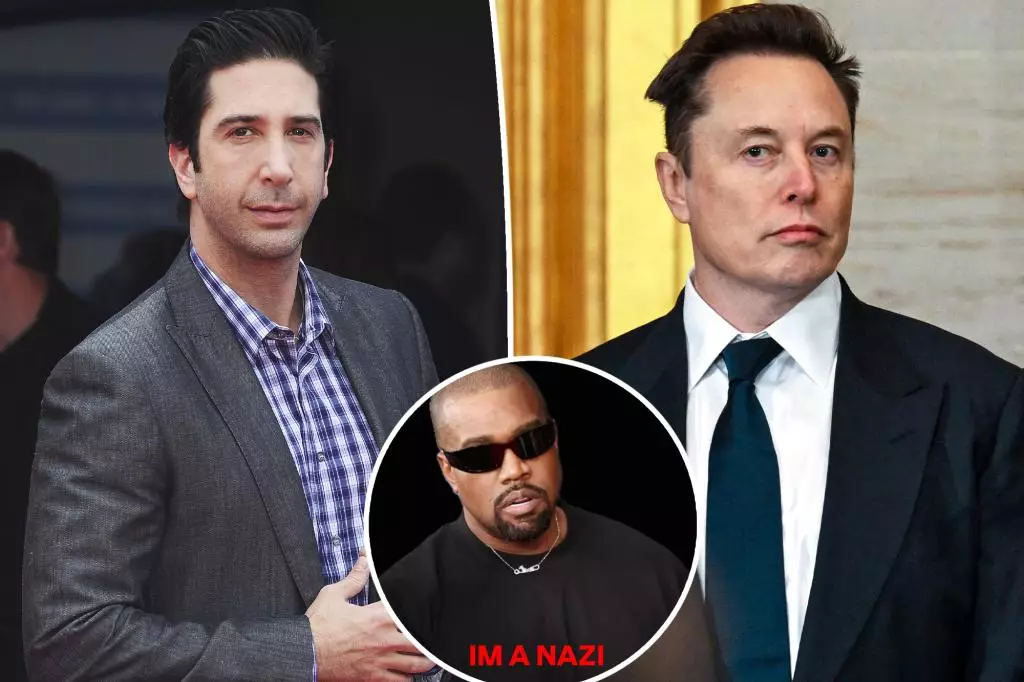In a shocking turn of events that has captivated and horrified the public, Kanye West—who now goes by Ye—has unleashed a tirade of antisemitic comments on social media, drawing attention not just for his controversial viewpoints but for the significant influence he wields through platforms like X (formerly Twitter). With over 32 million followers, West’s words are reverberating beyond the app, challenging a society that grapples with hate and bigotry in a time when sensitivity to racial and religious issues should be paramount.
Actor David Schwimmer, known for his role in the beloved sitcom “Friends,” took a bold stand by calling out West on Instagram. Schwimmer’s remarks come as a necessary reminder of the consequences that can arise from influential personalities propagating hate. His concrete assertion that Kanye’s posts contribute to real-world violence against the Jewish community underscores the urgent need for accountability among public figures. When Schwimmer tweeted, “Silence is complicity,” he wasn’t just expressing his frustration; he was urging a collective responsibility to confront hatred directly rather than ignoring it.
What makes West’s tweets particularly alarming is not just their blatant antisemitism but also the sheer number of individuals who might absorb this harmful ideology. Schwimmer’s observation about the exponential reach that West’s account has—more followers than there are Jews globally—illustrates an insidious potential for inciting hatred. It raises fundamental questions about the ethical obligations of social media platforms. Should these platforms, which prioritize free expression and speech, also bear the weight of potentially inciting violence and bigotry?
The capacity for social media to amplify extremist views has been a troubling development in recent years, where dialogues surrounding race, ethnicity, and culture are often tainted by hatred and ignorance. West’s statements, likening himself to a Nazi and spewing stereotypes, betray a profound disconnect from the realities faced by marginalized communities while also capitalizing on his own celebrity to disseminate these views.
Kanye West’s antics often obscure the threat posed by his words. The cult of celebrity surrounding figures like West permits them to transcend criticism even when their actions and words are harmful. His recent comments, including the declaration that he “loves Hitler,” should prompt a broader discussion about the extent to which society values fame and wealth over ethics and responsibility. When one examines hip-hop’s history, it is layered with complexity, where figures have both uplifted and marginalized communities at once. West’s recent actions represent a jarring departure from constructive influence, opting instead for provocateur status.
Furthermore, his relationships and statements regarding his wife Bianca Censori—as part of a scandalous red carpet stunt—only serve as a diversion from his irresponsibility online. By framing his relationship in terms that hint at dominion and denigration of progressive values, West seeks to justify a backlash against any form of criticism he receives. This pattern of gaslighting is not merely personal; it ties into a broader sociocultural phenomenon where influential males tend to dismiss opposing viewpoints as “woke” or extremist on behalf of their fanfare—despite the actual harm incurred.
The broader implications of West’s recent diatribes beckon introspection not just from followers but also from those in power. Calls from individuals like Schwimmer for platforms to take action against hate speech highlight an essential element of community accountability. The backlash against West’s antisemitic statements must extend beyond personal outrage and manifest in structural changes within social media ecosystems.
Moreover, banning individuals who articulate such dangerous ideologies is a contentious issue. While censorship can lead to debates over freedom of speech, the moral quandary surrounding hate speech amplifies the importance of fostering an environment that lets diverse voices thrive without the overshadowing specter of bigotry.
In the face of these alarming developments, a collaborative cultural effort is needed. As fans, artists, and influential individuals reclaim their platforms, the ultimate goal should be to create a culture that rejects hate in all its forms. We must prioritize honesty, compassion, and awareness over the allure of celebrity grip. The growing trend of public figures acting irresponsibly serves as a pivotal reminder: we must assertively confront hate with words of counter-advocacy, unity, and understanding. The fight against prejudice must be continuous and relentless, forging a future that respects and embraces diversity, rejecting all forms of malignance once and for all.

